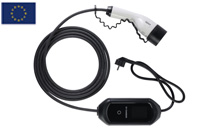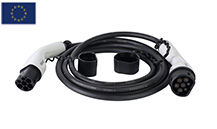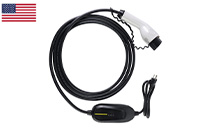The common EV charging plugs in the market today can be divided into AC plugs and DC plugs, where the plugs for AC include Type 1 and Type 2 plugs, and the plugs for DC include CHAdeMo and CCS plugs. This article focuses on EV chargers with Type 1 plugs.
Type 1 EV charging cables come with standard J1772 connectors for vehicles with Type 1 inlets and Type 1 EV charging station sockets.
Type 1 plugs, also called Type 1 connectors, are single-phase plugs that are standard on EVs in the U.S. and Asia and allow owners to charge their EVs at up to 7.4KW, depending on the vehicle's charging power and grid capacity.
The Type 1 connector features a 5-hole design to provide charging at 3.7KW to 7.4KW AC power, providing a range of 12.5-25 miles per hour of charging. Type 1 plugs feature pins for transmitting power loads and a grounding mechanism for safety.
The Type 1 connector comes with a latching design, the main purpose of which is to ensure that the plug stays securely in place during charging. That said, the latch is designed primarily to prevent the charging cable from accidentally falling out, but everyone can remove the charging cable directly from the vehicle.
Factors that affect the charging rate of an electric vehicle include the size of the vehicle's own battery, the current capacity of the battery, the maximum charge rate at the selected charging point, and the charging environment. When charging with this charger, the charging rate is slower, but slow charging is more friendly to the battery and lasts longer.
FAFA-E 1 type charging cable has good flexibility, long bending life, ergonomic design of the connector, small handle for gripping and easy to install the housing. The inside of the connector is specially designed to effectively prevent internal moisture and corrosion in the crimp area.
FAFA-E makes charging easier,About us:https://www.fafa-e.com/






 简体中文
简体中文
